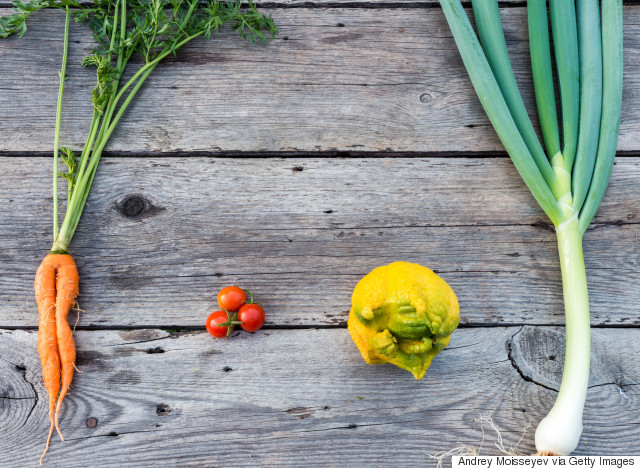
Ugliness has always been linked to nastiness and perversion. We've all seen the typecasts of the handsome good guy and the unattractive bad guy in Hollywood movies over the years. (Somehow, this formula is not as straightforward when it comes to the representation of female characters -- evil or malicious women can also have seductive attributes.)
Ugly fruits and vegetables are morally discriminated against. That is, they are treated with prejudice because of their unattractive appearance. As a result, 1.3 billion tons of food are tossed in the trash around the world every year.
These ugly fruits and vegetables can't compare with the dominant canon of fruits and vegetables. The latter look beautiful, and with their appearance comes an expectation for succulent tastes. As a result, millions of food items are pushed aside and thrown in dumps because they do not meet the aesthetic criteria of shape and color. Such aesthetic requirements are dictated by consumers and by retailer prerequisites. It is therefore more profitable to have identical merchandise that is easier to pack and store. For this reason, large-scale harvesters automatically get rid of vegetables and fruits that fall from grace.
There's an assumption that beauty and quality are connected by an unbreakable bond.
In my view, the criteria for what is ugly or beautiful is controversial. Some vegetables deviate from the required criteria -- these may include: An attractive carrot with two heads, a tomato with a horn, a twisted pepper, a gigantic and crooked cucumber or zucchini, sunburned Swiss chard or some spinach with tips weakened and rendered pale by the harsh sunlight.

But what is or is not acceptable is a cultural matter, and therefore can be changed. The differences we see in shape and color within one plant group (among apples, for example) makes us believe that ugly and beautiful fruits and vegetables will taste differently; the ugly ones will not be as tasty and may even be harmful for your stomach and health. There's an assumption that beauty and quality are connected by an unbreakable bond. Ugly fruits and vegetables are surrounded by negative stereotypes that breed fear and suspicion.
More and more people are becoming aware of this absurd discrimination against ugly vegetables, and the associated waste of tons of produce. For example, a well-known European supermarket chain has taken on the challenge of giving authentic rights to unattractive fruits and vegetables by offering them at more attractive prices. They are giving vegetables the right to be consumed, independently of their color or shape, and to be enjoyed without prejudice or discrimination. This initiative is undoubtedly inspired by the efforts of the European Union (2014 was the European year against food waste).
In my opinion, awareness, the feeling of self-efficiency, and responsibility are necessary ingredients for action and therefore for citizens' political participation.
There is a similar project run by the Portuguese company Fruta Horrible (Horrible Fruit), which uses ugly foods to help families who cannot pay full prices at the supermarkets.
It's obvious that the initiative by the supermarket chain mentioned above is based on commercial interests; interests that, without a doubt, we consider as legitimate. We look at this project from a pragmatic point of view: If it expands, if many other chains join this commercial adventure, many people around the world would have the opportunity to eat fruits and vegetables on a daily basis, and not only every once in a while.
Movements emerging in major cities, such as the ugly food movement, are very inspiring. This countercultural gesture subverts the relationship between the attractiveness of the food and its ability to nourish. If this movement grows, it would have obvious consequences for food, but it would also have a significant impact on the beliefs and attitudes of many human beings.
In my opinion, awareness, the feeling of self-efficiency, and responsibility are necessary ingredients for action and therefore for citizens' political participation.
Maybe our country would like to participate and launch campaigns so that consumers, distributors and sellers modify their beliefs and give ugliness a chance.
This post first appeared on HuffPost Spain. It has been translated into English and edited for clarity.